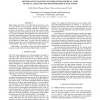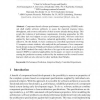14 search results - page 1 / 3 » Learning by Reading: A Prototype System, Performance Baselin... |
AAAI
2007
13 years 7 months ago
2007
A traditional goal of Artificial Intelligence research has been a system that can read unrestricted natural language texts on a given topic, build a model of that topic and reason...
AAAI
2010
13 years 6 months ago
2010
We consider here the problem of building a never-ending language learner; that is, an intelligent computer agent that runs forever and that each day must (1) extract, or read, inf...
ICASSP
2008
IEEE
13 years 11 months ago
2008
IEEE
Sight-reading is the ability to read and perform music from a written score with little or no preparation. Though an integral part of musicianship, it is rarely or minimally addre...
SIGCSE
1996
ACM
13 years 8 months ago
1996
ACM
lhis paper describes the use of cooperative group learning concepts in support of an undergraduate database mrtnagement course that emphasizes the theoretical and practical aspect...
EPEW
2008
Springer
13 years 6 months ago
2008
Springer
Abstract. Component-based software performance engineering (CBSPE) methods shall enable software architects to assess the expected response times, throughputs, and resource utiliza...


